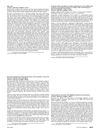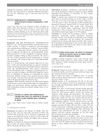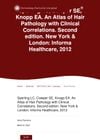 3 citations,
November 2018 in “Oncology issues”
3 citations,
November 2018 in “Oncology issues” Cancer survivors often experience worse skin problems from treatment than expected, and working with dermatologists could help improve their condition.
 8 citations,
September 2015 in “Journal of the European Academy of Dermatology and Venereology”
8 citations,
September 2015 in “Journal of the European Academy of Dermatology and Venereology” Hair and scalp pain is more common and severe in breast cancer patients on chemotherapy than those on tamoxifen.
 21 citations,
April 2015 in “Psychology Research and Behavior Management”
21 citations,
April 2015 in “Psychology Research and Behavior Management” Cognitive-behavioral therapy is the best treatment for hair-pulling disorder, and combining it with other therapies could improve results.
 8 citations,
July 2008 in “Facial Plastic Surgery Clinics of North America”
8 citations,
July 2008 in “Facial Plastic Surgery Clinics of North America” More men are getting non-surgical cosmetic treatments due to increased income and social acceptance, with less invasive options being preferred.
 April 2024 in “Archiv EuroMedica”
April 2024 in “Archiv EuroMedica” Platelet-Rich Plasma therapy helps increase hair density and regrowth for some types of hair loss.
 January 2024 in “JCPSP. Journal of the College of Physicians & Surgeons Pakistan”
January 2024 in “JCPSP. Journal of the College of Physicians & Surgeons Pakistan” PRP therapy is more effective than minoxidil for treating hair loss from androgenetic alopecia.
 42 citations,
July 2015 in “Journal of The American Academy of Dermatology”
42 citations,
July 2015 in “Journal of The American Academy of Dermatology” The conclusion is that oral contraceptives and antiandrogens can treat hirsutism and acne in women with cutaneous hyperandrogenism, but more research is needed for effective treatments, especially for hair loss.
April 2021 in “Libyan journal of medical sciences” A woman's hair loss improved with treatment after a COVID-19 infection.
 March 2012 in “Journal of The American Academy of Dermatology”
March 2012 in “Journal of The American Academy of Dermatology” Latisse is safe and effective for long-term eyelash growth in people with thin eyelashes from chemotherapy or unknown causes.
3 citations,
November 2022 in “International journal of environmental research and public health/International journal of environmental research and public health” Ethnic Indian women with PCOS often have early symptoms, delayed diagnosis, and need better information and support for treatment and lifestyle management.
 1 citations,
November 2022 in “Journal of The American Academy of Dermatology”
1 citations,
November 2022 in “Journal of The American Academy of Dermatology” Combining scalp photos with hair density and caliber measurements gives a more accurate assessment of hair loss.
7 citations,
August 2023 in “Ageing Research Reviews” More research is needed to understand hair aging and develop effective treatments.
April 2022 in “The Journal of Sexual Medicine” Finasteride alone increases suicide risk, but combining it with other treatments reduces this risk.
 June 1996 in “Irish Journal of Medical Science (1971 -)”
June 1996 in “Irish Journal of Medical Science (1971 -)” The document summarizes medical findings on topics like heart rhythm treatment, sleep apnea therapy, and various health conditions and treatments.
138 citations,
March 2021 in “Journal of the American Academy of Dermatology” Ritlecitinib and brepocitinib effectively regrow hair in alopecia areata patients.
 176 citations,
June 2017 in “Sexual Medicine Reviews”
176 citations,
June 2017 in “Sexual Medicine Reviews” Erectile dysfunction is increasingly common in men under 40, with many physical and psychological causes, and various treatment options available.
7 citations,
May 2014 in “Iranian Red Crescent medical journal” Laser hair removal is effective for hirsutism when combined with treatment for the underlying causes.
 May 2012 in “The journal of nervous and mental disease”
May 2012 in “The journal of nervous and mental disease” The book provides comprehensive information on Impulse Control Disorders but lacks definitive evidence for effective treatments.
 1 citations,
December 2022 in “Actas dermo-sifiliográficas/Actas dermo-sifiliográficas”
1 citations,
December 2022 in “Actas dermo-sifiliográficas/Actas dermo-sifiliográficas” Sensitive scalp causes discomfort and hair loss, treated with personalized care.
 26 citations,
July 1995 in “Neurobiology of Aging”
26 citations,
July 1995 in “Neurobiology of Aging” Finasteride affects prostate weights and pituitary activity differently with age.
 October 2014 in “Archives of disease in childhood”
October 2014 in “Archives of disease in childhood” Childhood cancer diagnosis leads to long-term physical and emotional health issues in parents.
 1 citations,
January 2013 in “Dermatology practical & conceptual”
1 citations,
January 2013 in “Dermatology practical & conceptual” The book is a useful guide for identifying hair loss conditions with clear photos and treatment tips, recommended for skin and hair specialists.
 22 citations,
May 2011 in “American Journal of Clinical Dermatology”
22 citations,
May 2011 in “American Journal of Clinical Dermatology” Recognizing and managing skin-related psychiatric disorders in children is crucial for effective treatment.
 March 2024 in “CRC Press eBooks”
March 2024 in “CRC Press eBooks” Nutraceuticals can effectively manage hormonal imbalances and related health issues.
9 citations,
August 2019 in “Lupus” Poor body image from pain can lead to more depression in lupus patients.
 4 citations,
August 2013 in “Case reports in dermatology”
4 citations,
August 2013 in “Case reports in dermatology” A patient with total hair loss developed vitiligo after using a treatment called DCP.
 88 citations,
October 2002 in “Journal of Dermatology”
88 citations,
October 2002 in “Journal of Dermatology” Finasteride for hair loss may cause depression, affecting sleep and relationships.
 September 2003 in “Clinics in Family Practice”
September 2003 in “Clinics in Family Practice” Different hair diseases affect people during childbearing years, with treatments ranging from medication to psychological support.
12 citations,
February 2017 in “Journal of neuroscience research” Removing certain brain receptors in mice worsens seizure severity and response to treatment during hormone withdrawal.
 17 citations,
October 2015 in “Medicine and Pharmacy Reports”
17 citations,
October 2015 in “Medicine and Pharmacy Reports” Animal models are crucial for learning about hair loss and finding treatments.





















